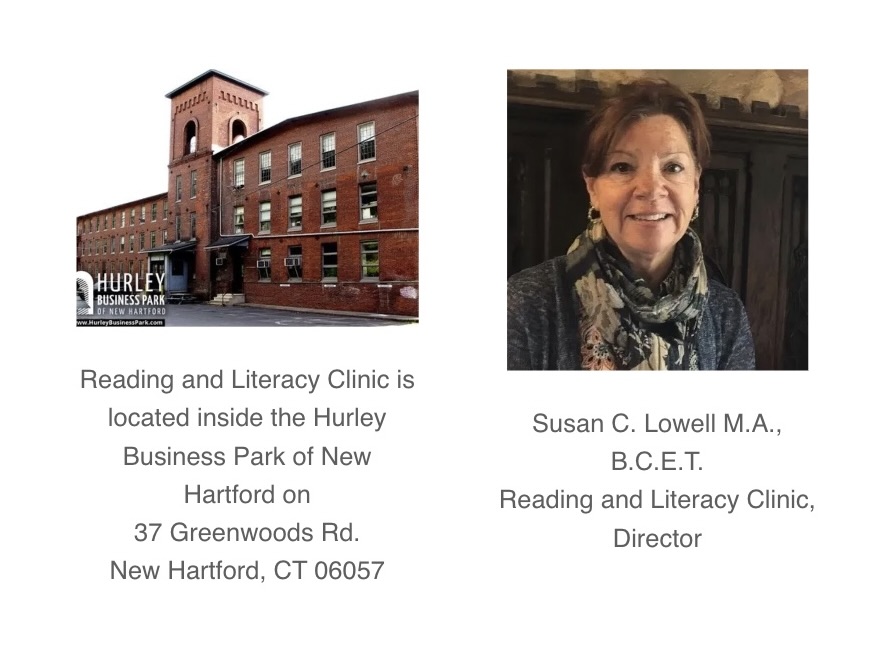ABOUT READING AND LITERACY CLINIC
Reading and Literacy Clinic is a clinical private practice directed by Susan C. Lowell in New Hartford, CT that provides educational testing, consultation, and advocacy, specializing in assessment of Specific Learning Disabilities, reading disorders, and dyslexia. Testing for dyslexia is completed as part of the educational evaluation.
WHAT IS DYSLEXIA?
Dyslexia is a specific learning disability that is neurobiological in origin. It is characterized by difficulties with accurate and/or fluent word recognition and by poor spelling and decoding abilities. These difficulties typically result from a deficit in the phonological component of language that is often unexpected in relation to other cognitive abilities and the provision of effective classroom instruction. Secondary consequences may include problems in reading comprehension and reduced reading experience that can impede growth of vocabulary and background knowledge.
For more information, see The International Dyslexia Association (IDA) at https://www.dyslexiaida.org. Adopted by the IDA Board, November 2002 and has been used by the U.S. Federal Government’s Institutes of Child Health and Human Development (NICHD).
The Learning Disabilities Association of America (LDA) defines dyslexia as a learning disability in the area of reading. For more information about specific learning disabilities, see LDonline at https://www.ldonline.org.
In many states, Decoding Dyslexia is a network that provides parent support, information, and advocacy (including advocacy to support dyslexia legislation at the state and national level) for students and adults with dyslexia and their families. Information about Decoding Dyslexia in your state can be found at https://dyslexiaida.org/decoding-dyslexia/.
IS DYSLEXIA COVERED UNDER FEDERAL SPECIAL EDUCATION LAW?
The answer is yes. Dyslexia is listed under the category of Specific Learning Disability in federal special education law. In fact, research finds that dyslexia is very prevalent and is the most common Specific Learning Disability.
DO ALL STATES FOLLOW SPECIAL EDUCATION LAW?
The answer is yes, they must. For more information, please see Ms. Lowell’s “Ask The Expert” response to this question on the United States Department of Education website, National Center on Improving Literacy, https://improvingliteracy.org/, under ‘For Parents and Families’ section.
LEARNING DISABILITIES AND DYSLEXIA
Dyslexia (or specific reading disability) is the most common and carefully studied of the learning disabilities, affecting 80% of all those identified as learning disabled.
Sally E. Shaywitz, M.D., Department of Pediatrics, Yale University, New England Journal of Medicine, Volume 338, Number 5, 1998.
SYMPTOMS OF DYSLEXIA – THE PRESCHOOL YEARS
The earliest clues involve mostly SPOKEN LANGUAGE. The very first clue may be delayed
language. Once the child begins to speak, look for:
- Trouble learning common nursery rhymes such as “Jack and Jill,” “Humpty Dumpty,”
etc. - A lack of appreciation of rhymes.
- Mispronouncing words or persistent baby talk.
- Difficulty in learning and remembering names of letters.
- Failure to know the letters in his own name.
SYMPTOMS OF DYSLEXIA – KINDERGARTEN AND FIRST GRADE
- Does not understand that words come apart; for example, that ‘batboy’ can be pulled
apart into ‘bat’ and ‘boy’, and later on that the word ‘bat’ can be broken down into
/b/…/a/…/t/. - Inability to associate letters with sounds.
- Reading errors that have no connection to the sounds of the letters, for example reading
‘big’ as “goat.” - Cannot read or sound out simple words—mat, hop, nap, etc.
- A history of reading problems in parents or siblings.
SYMPTOMS OF DYSLEXIA – GRADES 2, 3, 4
- Slow and labored reading.
- Misreads same words repeatedly.
- Cannot read nonsense words.
- Trouble with reading and spelling small, easy words (this, that, and, is, was, etc.).
- Comprehension better than decoding.
- Listening comprehension better than reading comprehension.
- Weak spelling.
- Avoidance of writing.
SYMPTOMS OF DYSLEXIA – GRADE 5 AND UP
- Poor fluency (slow reading).
- Many errors when reading.
- Cannot read nonsense words.
- Cannot read longer words (two syllables or more).
- Avoids reading—little or no reading for pleasure.
- Weak spelling.
- Brief writing with poor spelling.
- Vocabulary can lag behind.
- Struggles with foreign language study.
Sally Shaywitz, M.D., Overcoming Dyslexia (Alfred A. Knopf Publishers, NY, 2003).
WHAT IS A LEARNING DISABILITY?
A learning disability is a neurological disorder. In simple terms, a learning disability results from
a difference in the way a person’s brain is “wired.” Children with learning disabilities are as smart as or smarter than their peers. But they may have difficulty reading, writing, spelling, reasoning, recalling, and/or organizing information if left to figure things out by themselves or if taught in conventional ways.
A learning disability can’t be cured or fixed; it is a lifelong issue. With the right support and
intervention, however, children with learning disabilities can succeed in school and go on to
successful, often distinguished careers later in life. Parents can help children with learning disabilities achieve such success by encouraging their strengths, knowing their weaknesses, understanding the educational system, working with heyprofessionals, and learning about strategies for dealing with specific difficulties.
For more information, see LD-ONLINE at https://www.ldonline.org.
EVALUATION, CONSULTATION, AND ADVOCACY INFORMATION
The Reading and Literacy Clinic is a clinical private practice specializing in educational
evaluation, consultation, and advocacy, specializing in assessment of Specific Learning Disabilities, reading disorders, and dyslexia.
Testing for dyslexia is completed as part of the educational evaluation.
